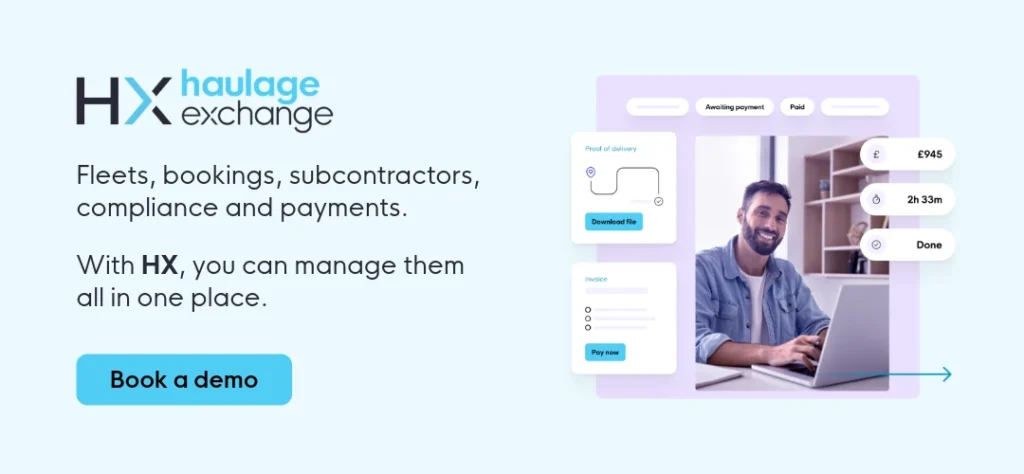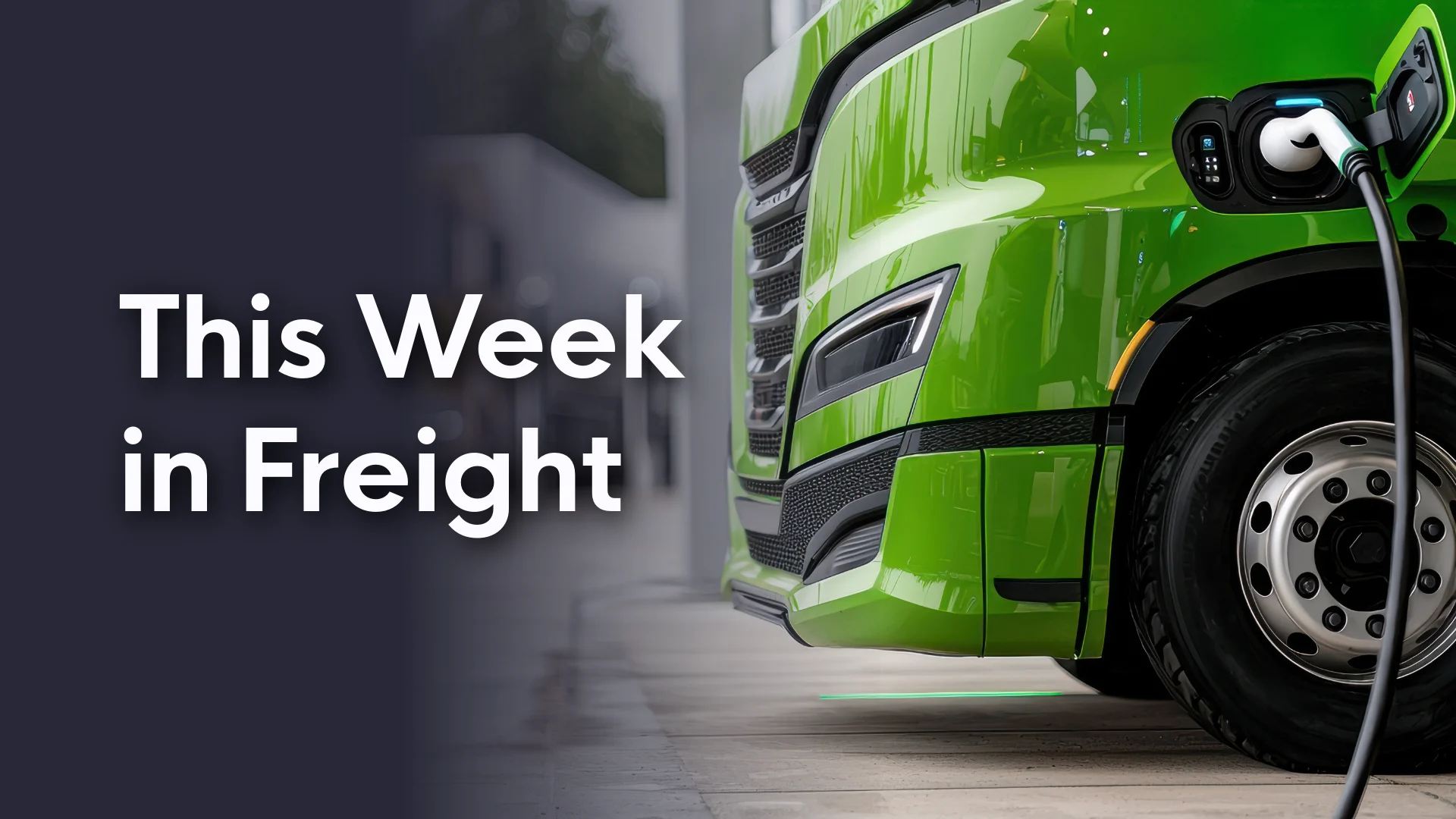Many haulage companies move loads for a mix of direct customers and third-party logistics providers. While some contracts come from retailers or manufacturers, others are subcontracted through freight brokers and freight forwarders.
Understanding the difference between these two roles helps hauliers know how they operate, what to expect when working with them, and how to build strong business relationships.
What we’ll cover
What is a freight broker?
A freight broker connects shippers with carriers but never takes ownership of the cargo. Their role is purely to arrange transport, negotiate rates, and match loads with available vehicles.
For haulage companies, this means working with brokers often results in short-term, transactional work rather than ongoing contracts. However, a good broker can provide regular loads, reducing your fleet’s empty journeys.
Regulations and certifications for freight brokers in the UK
Unlike in the US, freight brokers in the UK don’t need a specific licence. However, they must comply with freight transport regulations and contractual obligations.
Many brokers join industry bodies like the Road Haulage Association (RHA) or the Freight Transport Association (FTA). Working with an accredited broker helps hauliers avoid late payments and unreliable customers.
What is a freight forwarder?
A freight forwarder manages the entire logistics process for a shipment, handling documentation, transport coordination, and customs clearance. Unlike freight brokers, freight forwarding often includes additional services such as warehousing and cargo insurance.
For hauliers, this means that work subcontracted by a forwarder is often part of a larger logistics chain. A forwarder may arrange part of a multimodal transportation journey, meaning a load could be moving between road, sea, and air transport.
Legal and regulatory requirements for freight forwarders
Many UK freight forwarders are members of the British International Freight Association (BIFA), which sets professional standards. Forwarders handling international freight must also comply with customs laws and may operate through a bonded warehouse for temporary storage.
Some forwarders offer their customers freight forwarder cargo insurance, which protects goods during transit – or at least, they should. If you take work from freight forwarders, make sure you double-check the haulage insurance responsibilities, such as whether you need CMR insurance, before accepting the job.

What it’s like to work with brokers and forwarders
As a haulage company, you’re always looking to expand your customer base to keep your vehicles moving and avoid empty miles. Some contracts come directly from businesses like retailers or manufacturers, but freight brokers and freight forwarders can give you access to a steady flow of jobs, often filling gaps between direct contracts.
However, working with them comes with different expectations and ways of operating.
Both freight brokers and freight forwarders work with hauliers, but their business models differ. Here’s a comparison:
| Feature | Freight Broker | Freight Forwarder |
|---|---|---|
| Owns the cargo? | No | No |
| Arranges transport? | Yes | Yes |
| Handles documentation? | Limited | Yes |
| Provides storage? | No | Yes |
| Deals with customs? | No | Yes |
Working with a freight broker
A freight broker focuses on finding available hauliers to move loads for their customers. Their job is to match freight with the right vehicle at the best possible rate.
For hauliers, this means:
- Work is often last-minute, with jobs appearing on load boards or through direct broker contact.
- Rates can be lower than direct contracts, as brokers take a cut for arranging the load.
- Payments depend on the broker’s terms, which can range from instant to 60-day settlements.
Brokers don’t own the freight, so they act purely as middlemen. Some use freight tracking software to keep shippers updated, meaning hauliers may need to provide live location data during transport.
Working with a freight forwarder
A freight forwarder is responsible for the entire logistics process, from arranging transport to handling customs paperwork. Forwarders manage freight for their own customers, which can include manufacturers, retailers, or import/export firms.
For haulage companies, this means that:
- Jobs are often part of a larger supply chain, sometimes involving multiple transport modes.
- Work can be more structured, with longer lead times than brokered loads.
- Some forwarders offer regular subcontracting agreements, providing a steady source of jobs.
Many freight forwarding services also arrange international freight, meaning you may be asked to transport loads to ports or deliver goods cleared from customs. Some forwarders act as an NVOCC, issuing transport documents and working with multiple carriers to complete shipments.
Why it’s worth having broker and forwarder customers
Working with freight brokers and freight forwarders offers a major advantage: access to more work. Instead of relying solely on direct contracts, you can tap into an established network of customers through these intermediaries.
This means:
- More job opportunities without spending time and resources on sales.
- The ability to fill empty miles with brokered or forwarded loads.
- A mix of short-term (brokered) and long-term (forwarded) work to keep the fleet running.
Some forwarders also provide freight forwarder cargo insurance, meaning you may not need to arrange additional cover for certain jobs. Forwarders handling customs-controlled shipments might use a bonded warehouse, where you’re are responsible for collecting or delivering goods under strict customs regulations.
By working with both brokers and forwarders, you can build relationships across the industry, increase your workload, and keep your vehicles moving without relying solely on your own direct customer base.
Conclusion
For hauliers, both freight brokers and freight forwarders are potential customers. Brokers provide quick access to loads, while forwarders offer structured logistics contracts.
By understanding how these businesses work, you can build strong relationships, choose reliable partners, and take on the right jobs for your fleet.
Frequently Asked Questions
Do freight brokers pay hauliers directly?
Yes, but payment terms vary. Some brokers pay immediately, while others have 30–60 day terms. Checking a broker’s reputation and credit history helps avoid payment issues.
Can a haulier work with both brokers and forwarders?
Yes. Many hauliers take a mix of freight brokerage work for quick jobs and freight forwarding contracts for more stable income.
How do forwarders handle customs clearance?
They complete import/export paperwork and may use a bonded warehouse to store goods until duties are paid.
What’s the risk of working with a freight broker?
Brokers don’t own the freight, so they rely on shipper payments before paying hauliers. This can lead to delays if the broker isn’t financially stable.
Do hauliers need extra insurance when working with a freight forwarder?
It depends on the contract. Some forwarders include freight forwarder cargo insurance, but others require hauliers to have their own cover.




